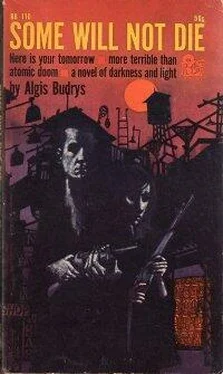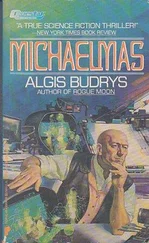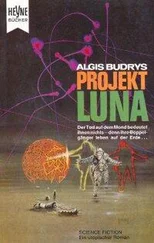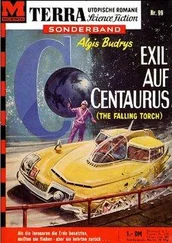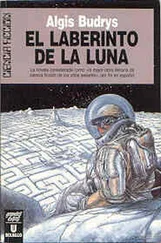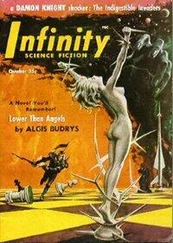Algis Budrys - Some Will Not Die
Здесь есть возможность читать онлайн «Algis Budrys - Some Will Not Die» весь текст электронной книги совершенно бесплатно (целиком полную версию без сокращений). В некоторых случаях можно слушать аудио, скачать через торрент в формате fb2 и присутствует краткое содержание. Год выпуска: 1961, Издательство: Regency Books, Жанр: Фантастика и фэнтези, на английском языке. Описание произведения, (предисловие) а так же отзывы посетителей доступны на портале библиотеки ЛибКат.
- Название:Some Will Not Die
- Автор:
- Издательство:Regency Books
- Жанр:
- Год:1961
- ISBN:нет данных
- Рейтинг книги:4 / 5. Голосов: 1
-
Избранное:Добавить в избранное
- Отзывы:
-
Ваша оценка:
- 80
- 1
- 2
- 3
- 4
- 5
Some Will Not Die: краткое содержание, описание и аннотация
Предлагаем к чтению аннотацию, описание, краткое содержание или предисловие (зависит от того, что написал сам автор книги «Some Will Not Die»). Если вы не нашли необходимую информацию о книге — напишите в комментариях, мы постараемся отыскать её.
Some Will Not Die — читать онлайн бесплатно полную книгу (весь текст) целиком
Ниже представлен текст книги, разбитый по страницам. Система сохранения места последней прочитанной страницы, позволяет с удобством читать онлайн бесплатно книгу «Some Will Not Die», без необходимости каждый раз заново искать на чём Вы остановились. Поставьте закладку, и сможете в любой момент перейти на страницу, на которой закончили чтение.
Интервал:
Закладка:
Custis wondered how he could keep them all supplied, and the answer he got from looking around was that he couldn’t do it very well. The huts were dark and dingy, with what looked like dirt floors. A few wan-looking women were carrying water up from a spring, balancing pails made out of cut-down oil cans. They were raggedly dressed, and the spindly-legged children that trotted beside them were hollow-eyed. Here and there, among the rocks, there were a few patches of scraggly garden. Up at one end of the valley, a small herd of gaunt cows was grazing on indifferent grass.
Custis nodded to himself It confirmed something he’d been thinking for a couple of years; the bandits were still crossing the plains to raid into Republican territory, but they’d never dared set up their own towns on the untenable prairies. It was an impossible thing to have every man’s hand against you and still try to make the change to a settled life.
But with women and children, the bandits needed a permanent camp somewhere. So now they were pulled back all the way into the mountains, trying to make a go of it, but with their weapons wearing out. They were dying on the vine, something left behind, and by the time the cities started spreading out their holdings again, there’d be little here to stop them. If the cities could ever get themselves organized. Maybe everything was dying. The legendary East and South were too far away to count. Maybe everything that counted was dying.
“In here,” the commander said, gesturing into a hut. Henley and Custis stepped inside, followed by two men with rifles and then the commander. The hut was almost bare except for a cot and a table with one chair, all made out of odd pieces of scrap lumber and weapons crates. The commander sat down facing them with his veined, brown-mottled hands resting on the stained wood.
Custis spread his feet and stood relaxed. Henley’s hands were playing with the seams along his pant legs.
“What about Berendtsen, Major?” the commander asked.
“We’ve heard he’s still alive.”
The commander snorted. “Fairy tales!”
“Possibly. But if he’s still alive, these mountains are the logical place for him to be.” Henley looked at the commander meaningfully.
The commander’s narrow lips twitched. “My name isn’t Berendtsen, Major. I don’t use his colors. And my men don’t call themselves The Army of Unification.”
“Things change,” Henley answered. “I didn’t say you were Berendtsen. But if Berendtsen got away from New York, he’d have been a fool to stay near there, or use his own name anywhere. If he’s in these mountains, he might not care to advertise the fact.”
The commander grimaced. “This isn’t getting us anywhere. What do you want from me?”
“Information, then, if you have it. We’ll pay for it, in cash or supplies, whatever you say, within reason.”
“In weapons?”
Henley paused for a moment. Then he nodded. “If that’s what you want.”
“And to blazes with what we do to the people in the independent towns? I suppose so. What about your own people in the outlying areas, once we’re re-armed?”
“It’s important that we have this information.”
The commander smiled coldly. “There’s no pretense of governing for anyone’s benefit but your own, is there?”
“I’m loyal to the Seventh Republic. I follow my orders.”
“No doubt. All right, what do you want to know?”
“Do you know of any groups in this area that Berendtsen might be leading?”
The commander shook his head. “No. There aren’t any other groups. I’ve consolidated them all. You can have that news gratis.”
“I see.” Henley smiled for the first time Custis had ever seen. It was an odd, spinsterish puckering of the lips. The corners of his eyes twinkled upward, and gave him the look of a sly cat. “You could have made me pay to find that out.”
“I’d rather not soil myself. A few rusty rifles pulled out of the old armories aren’t worth that much to me.”
Henley’s mouth twitched. He looked at the austere pride on the commander’s face, gathered like a mask of strength and youth on the gray stubbled cheeks, and then he said: “Well, if I ever do find him, I’m empowered to offer him the presidency of the Eighth Republic.” His eyes glittered and fastened like talons on the old commander’s expression.
Custis grunted to himself. He couldn’t say Henley had exactly surprised him.
And the old man was looking down at the tabletop, his old hands suddenly clenched. After a long time, he looked up slowly.
“So you’re not really working for the Seventh Republic. You’ve been sent up here to find a useful figurehead for a new combination of power.”
Henley smiled again, easily, blandly—and looked like a man who has shot his animal and only has to wait for it to die. “I wouldn’t put it that way. Though, naturally, we wouldn’t stand for any one-man dictatorships.”
“Naturally.” One corner of the commander’s lip lifted, and suddenly Custis saw Henley wasn’t so sure. Custis saw him tense, as though a dying tiger had suddenly lashed out a paw. The commander’s eyes were narrowed. “I’m through talking to you for the moment,” he said, and Custis wondered how much of his weakness had been carefully laid on. “You’ll wait outside. I want to talk to Custis.” He motioned to the two waiting riflemen. “Take him out—put him in another hut and keep your eyes on him.”
And Custis was left alone in the hut with the old commander.
The commander looked up at him. “That’s your own car out there?”
Custis nodded.
“So you’re just under contract to the Seventh Republic—you’ve got no particular loyalty to the government.”
Custis shrugged. “Right now, there’s no tellin’ who I’m hired out to.” He was willing to wait the commander out and see what he was driving at.
“You did a good job of handling things, this morning. What are you—about twenty-nine, thirty?”
“Twenty-six.”
“So you were born four years after Berendtsen was killed. What do you know about him? What have you heard?”
“Usual stuff. After the plague, everything was a mess. Berendtsen put an army together, took over the territory, made the survivors obey one law, and strengthened things out that way.”
The commander nodded to himself—an old man’s nod, passing judgment on the far past. “You left out a lot of people between the plague and Berendtsen. And you’ll never imagine how bad it was. But that’ll do. Do you know why he did it?”
“Why’s anybody set up a government? He wanted to be boss, I guess. Then somebody decided he was too big, and cut him down. Then the people cut the somebody down. But I figure Berendtsen’s dead, for sure.”
“Do you?” the commander’s eyes were steady on Custis.
Custis tightened his jaw. “Yeah.”
“Do I look like Berendtsen?” the commander asked softly.
“No.”
“But hand-drawn portraits thirty years old don’t really mean anything, do they, Custis?”
“Well, no.” Joe felt himself getting edgy. “But you’re not Berendtsen,” he growled belligerently. “I’m sure Berendtsen’s dead.”
The old commander sighed. “Of course. Tell me about Chicago,” he said, going off in a new direction. “Has it changed much? Have they cleaned it up? Or are they simply abandoning the buildings that’re really falling down?”
“Sometimes. But they try and fix ’em up, sometimes.”
“Only sometimes.” The commander shook his head regretfully. “I had hoped that by this time, no matter what kind of men were in charge…”
“When’s the last time you were there?”
“I was never there. But I’ve seen a city or two.” The commander smiled at Custis. “Tell me about this car of yours. I used to be quite fond of mechanized equipment, once.” Now he was an old man again, dreaming back into the past, only half-seeing Custis. “We took a whole city once, with almost no infantry support at all. That’s a hard thing to do, even with tanks, and all I had was armored cars. Just twenty of them, and the heaviest weapons they mounted were light automatic cannon in demiturrets. No tracks—I remember they shot our tires flat almost at once, and we went bumping through the streets. Just armored scout cars, really, but we used them like tanks, and we took the city. Not a very large city.” He looked down at his hands. “Not very large, no. But still, I don’t believe that had ever been done before.”
Читать дальшеИнтервал:
Закладка:
Похожие книги на «Some Will Not Die»
Представляем Вашему вниманию похожие книги на «Some Will Not Die» списком для выбора. Мы отобрали схожую по названию и смыслу литературу в надежде предоставить читателям больше вариантов отыскать новые, интересные, ещё непрочитанные произведения.
Обсуждение, отзывы о книге «Some Will Not Die» и просто собственные мнения читателей. Оставьте ваши комментарии, напишите, что Вы думаете о произведении, его смысле или главных героях. Укажите что конкретно понравилось, а что нет, и почему Вы так считаете.
